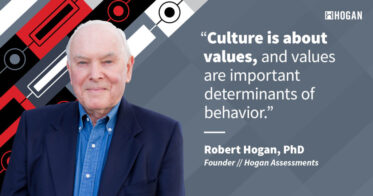Assessment-based coaching is transformative, far superior to traditional coaching because it is grounded in objective data essential to the coach and the participant.
Recently on The Science of Personality, cohosts Ryne Sherman, PhD, and Blake Loepp spoke with four-time guest Jackie VanBroekhoven Sahm, MS, Hogan’s director of product development, about why assessment-based coaching is better than any other kind.
In her nearly 15 years at Hogan, Jackie has witnessed coaching evolve in the world of work and knows the impact it can have on people—when it’s done the right way.
Coaching Market Trends
According to Jackie, the executive coaching market is valued at around $9.3 billion—and growing at roughly 12% annually. “In the past, executive coaching was seen as an intervention,” Jackie said. “Now it’s seen as a performance enhancer, a signal to the executive that the organization wants to continue investing in them.” She also explained that executive coaching has gained a recent emphasis on well-being.
Other trends include the democratization of coaching, where coaching is provided for people at all levels, not just executives and high potentials. Technology has reduced some barriers to providing a coach to everyone. Artificial intelligence in the coaching space shows potential and seems to be gaining influence too.
The coaching market is absolutely flooded, which poses challenges for finding quality coaching. Approximately 93,000 coaches are certified by the International Coaching Federation alone. Many other credentialing providers are available, but there are no regulatory bodies for coaching. Given the quantity of coaches, their quality can be as variable as their rates. “Consumers should be skeptical of bargain basement pricing for coaching because you really do get what you pay for in this space,” Jackie cautioned.
Evaluating Coaching Outcomes
“The way coaching outcomes are evaluated today is mostly what some people refer to as ‘happy sheets,’ which basically means asking people how they liked the experience,” Jackie said. As many as 86% to 96% of people say they enjoyed the coaching experience, were satisfied, and would recommend coaching to others. This doesn’t mean that most coaches are excellent but that most people enjoy talking about themselves.
Satisfaction and enjoyment are easy to measure. Measuring the business outcomes of coaching is more challenging. At Hogan, we look for outcomes, or the effectiveness of coaching, in the performance of the leader and their team, most importantly in their organizational function.
Instead of just giving advice or the space for participants to talk, quality coaches will focus on behavioral modification that affects measurable business outcomes. Like athletic coaches who emphasize practice, evaluation, and refinement, an executive coach should give practice assignments, expect the participant to obtain feedback, help the participant to analyze the results, and set new practice goals. The coach keeps the participant accountable for their progress within the scope of organizational performance.
Assessment-Based Coaching
The key difference between traditional coaching and assessment-based coaching is the use of a validated, quality diagnostic assessment of any kind. At Hogan, our best-in-class personality assessments are designed to predict workplace performance, or the way a leader or individual’s behavior will affect those around them. That’s not all that distinguishes assessment-based coaching, however.
Measurable
Assessment-based coaching is measurable. It’s not enough for a coach to look at performance reviews and ask the participant, for example, how many hours of sleep they are getting. Just as a physician shouldn’t treat a patient without running diagnostic tests, a coach shouldn’t coach a leader without assessment data. Coaching that is based on assessment establishes a benchmark for where the person is beginning their development. It is also an objective evaluation that allows for clear goal setting integral to a proper coaching plan. To paraphrase Lewis Carroll, if you don’t know where you’re going, any road will get you there.
Insightful
Coaches need data on the behavioral strengths and potential weaknesses that a person brings to their environment. The participant needs to know that too. “Assessments like Hogan can be a powerful source of self-insight that a leader cannot get from any other place,” Jackie pointed out. Often, people aren’t willing to speak truth to power, so executives receive feedback that is partial, indirect, or even distorted. Assessments can help identify maladaptive behaviors and opportunities for improvement.
Differentiating
Assessment-based coaching is also differentiating. Given the lack of a regulatory body in executive coaching, clients often use certification credentials to identify expertise in a coach or coaching firm. They expect coaches to have specific certifications that address their organizational needs. “If you don’t have those certifications, it can be a barrier to entry for large enterprise companies that have industrial-organizational psychologists on staff who know what they’re looking for in a coaching provider,” Jackie explained. “In other words, it’s not optional.”
Transformative
A high-quality assessment can dramatically improve the quality of coaching for both the leader and the coach. Long-lasting, meaningful, and deeply powerful coaching comes from valid assessments that represent the richness and complexity of individual differences—not those that reduce personality to a handful of types. Valid, reliable assessments such as Hogan’s (when used properly by an expert) can transform a leader’s understanding of themselves and their relationships with other people. “End users say things like, ‘This was life-changing. I wish I had had this assessment earlier in my career. Thank you for giving me this gift,’” Jackie said.
Assessment-Based Coaching and AI
With the democratization of coaching likely to continue, coaching tech will help to shape the future of the space. “I hope we will see coaching become more outcome oriented with more measurable results and that we can take advantage of the big data we have available,” Jackie said.
Even if AI coaches don’t prove equal to human coaches, Jackie pointed out that AI could help automate some of a coach’s preparation, interpretation, or analysis. “What I don’t think AI will necessarily be able to do is replicate what I think is one of the most important aspects of coaching, which is human connection,” she said.
This post was originally published on the Hogan Assessments blog.



